Researcher Profile: Lisa Powell, Former CSFS Postdoctoral Fellow
Current Associate Professor of Environmental Studies, Sweet Briar College
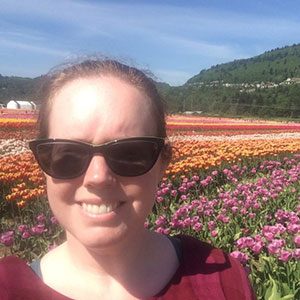
What is your title?
I am a postdoctoral researcher jointly appointed at UBC in the Centre for Sustainable Food Systems and at the University of the Fraser Valley.
What does your research with the Centre for Sustainable Food Systems at UBC Farm focus on?
One of the main focus areas of my research through CSFS is on “farm to school” programs and how they may contribute to fostering sustainable food systems. My research in this area started off looking at how institutional sourcing of local food can support farms and economic development. We have ended up also investigating farm to school programs as food literacy education initiatives and comparing how these programs have manifested in BC to other parts of the world. Even in BC schools that do not have a cafeteria to serve local food at, we still often see a lot of work with school gardens and other programs that support food literacy education, which has the potential for long term food systems impacts.
Another significant aspect of my work with the CSFS is translating research into usable formats that can be made available to farmers, food processors, and others working with food systems. In addition to being a researcher myself, I help to facilitate the sharing of the broad range of research coming out of CSFS, as well as work from our collaborators and partners. I am currently helping to build a web portal to support increased public access to research results and other resources related to food and agriculture in BC.
Why does this work matter to you?
I grew up on, and remain involved in, my family’s farm, where I’ve had a lot of hands-on experience with food systems and in particular food production. There I developed an understanding of farming’s economic realities and its relationship to environmental conditions. Because of this, I’m interested in research that can be used to help agricultural communities prosper, while also seeing the value and the need for the general public to acquire as much knowledge about food systems as possible. Even if people aren’t growing food themselves, they are still stakeholders as people who eat or engage with the food system in other ways.
What surprises you about this work?
It’s been a pleasant surprise to learn about the enthusiasm from people who are working in the farm to school movement. Seeing the passion in community members and organizations has been exciting and wonderful.
How important is the Centre for Sustainable Food Systems to your work?
The CSFS provides a valuable network that involves both researchers and those who are practitioners or working in the field. It’s great to be a part of that hub. The UBC Farm itself provides a lot of food literacy education programming. The UBC Farm is also a great model and learning tool for institutional sourcing of local food as they sell produce to UBC Food Services, which prepares meals in campus cafeterias.
What should people know about the CSFS at the UBC Farm that they probably don’t know?
They should know that the UBC Farm isn’t only a physical space. It also represents a larger network of researchers and outreach activities going on – both activities happening on the ground at the Farm but also those related to sustainable food systems happening beyond the Farm itself.
What’s your favourite thing to do at the UBC Farm?
Any given day, within a couple minutes walk, there may be internationally-known researchers installing new monitoring equipment in a field, children potting little seedlings, undergraduate classes recording soil sample data, field staff weighing harvests, and people of multiple generations talking and working together in the Indigenous Gardens. It’s really inspiring to be able to take a short walk and see so many people of different ages, interests and backgrounds all doing activities related to food systems in this one pretty small space.
April 18: Movie: Unsettling Environmental Review
By Justin Lee on October 18, 2017
April 18: Movie: Unsettling Environmental Review

What is lost in translation between the passion and creativity in and around the Enbridge and Kinder Morgan reviews and the dispassionate reports and recommendations?
Sept. 27: Good Food in the City: How Cultural Ideas About Food Shape Street Vending Regulation
By rachel ma on September 27, 2017
Sept. 27: Good Food in the City: How Cultural Ideas About Food Shape Street Vending Regulation
September 27, 2017, 12:30 p.m. – 1:30 p.m. MacMillan Building, Room 342.
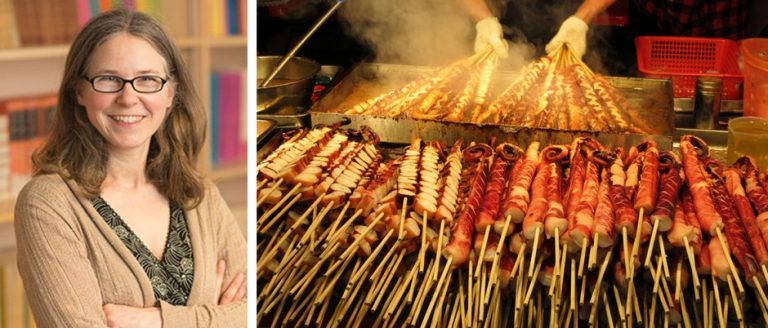
About the talk:
Dr. Amy Hanser’s talk will focus on her most recent research project, looking comparatively at the regulation of street commerce in China and North America. In particular, the project looks at the way Chinese cities are attempting to eliminate street vending, whereas some North American cities are embracing “street food” and food carts as emblems of cosmopolitan urbanity.
About Dr.Amy Hanser:
Dr. Amy Hanser is an associate professor at UBC’s Faculty of Sociology. Her research centers on topics such as work, gender, and the cultural aspects of markets, and most of her research has focused on contemporary China. Past research includes a study of service work and class inequality in urban China, published by Stanford University Press as Service Encounters: Class, Gender and the Market for Social Distinction in Urban China (2008). More recent projects examine Chinese consumer goods in North America and food safety and imported milk in China. In a current research project, funded by a SSHRC research grant, she is looking comparatively at the regulation of street commerce in China and North America, and in particular at the way Chinese cities manage and in many cases are attempting to eliminate street vending, whereas (some) North American cities are embracing “street food” and food carts as emblems of cosmopolitan urbanity.
The Future of Food Global Dialogue Series talks are free, with no RSVP required.
Decolonizing Research Methods Workshop, presented by the Future of Food Global Dialogue Series and the Food Systems Network
By rachel ma on September 14, 2017
Decolonizing Research Methods Workshop, presented by the Future of Food Global Dialogue Series and the Food Systems Network
Thursday, September 14, 2017 3:00 p.m. – 5:30 p.m. Liu Case Room, Liu Institute for Global Issues
Join the Food Systems Network for this Future of Food Global Dialogue Series workshop on Decolonizing Research Methods (DRM).
This workshop will begin with an introduction to DRM from Dr. Nora Angeles, Associate Professor at the School of Community and Regional Planning.
Dawn Hoogeveen (Postdoctoral fellow, IRES) will then discuss her use of DRM for her research in a brief session followed by Q&A.
The event will close with Dawn Morrison, Founder, Chair and Coordinator of the B.C. Food Systems Working Group on Indigenous Food Sovereignty, who will share her experiences straddling between the worlds of community organizing and academia and offer insights for engaging in this work.
You can also expect some delicious refreshments from Doughgirls.
Please RSVP to amber.heckelman@gmail.com.We will send a short list of suggested readings by Friday, Sept 8 so that everyone has the option of doing a bit of preparation leading up to the workshop. And please help us grow our network! This event is open to all and the FSN would like to expand its reach to students in faculties and disciplines across campus, so feel free to share this invite with friends.
Sept. 6: Seed Saving, Participatory Plant Breeding, and Community Supported Agriculture: multi-actor innovation platforms to support small scale farming in Southwest China with Dr. Yiching Song
By rachel ma on September 6, 2017
Sept. 6: Seed Saving, Participatory Plant Breeding, and Community Supported Agriculture: multi-actor innovation platforms to support small scale farming in Southwest China with Dr. Yiching Song
September 6, 2017 12:00 p.m. – 1:00 p.m. MacMillan Building, Room 258
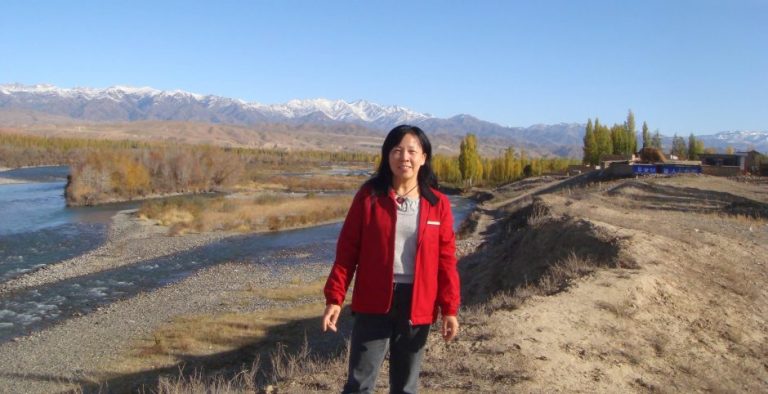
About Dr. Yiching Song:
Dr. Yiching Song obtained her Ph.D in rural sociology and rural development in Wageningen University, in the Netherlands in 1998. Since 2000, she has been a senior research fellow in the Centre for Chinese Agricultural Policy (CCAP), Chinese Academy of Science. She is also a lecture professor of the College of Humanity and Development of China Agricultural University and also hold the same position in Jilin Agricultural University. She has been appointed as a visiting senior research fellow in the China Centre for Intellectual Property in Agriculture (CCIPA), Chinese Academy of Agricultural Science. Her research focuses on sustainable agricultural and rural development policies in China covering a range of several related areas like agricultural research and extension, biodiversity and related IPR and ABS issues, rural community based development and farmer organization, and gender and related social issues, etc. Her main research methodology is participatory action research and she is leading a participatory action research program under the CCAP. For details please visit www.parinchina.org.
About Dr. Song’s Talk:
This paper presents the author and her team’s 15 year Participatory Plant Breeding (PPB) program in SW China, which has linked poor ethnic mountain farmers with crop scientists at national and provincial level. Through community based PPB, working with farmers, maize and rice varieties have been conserved, improved and developed with both higher yields and improved resilience to drought and pests, resulting in greatly improved variety adoption rates, and many resilient local landraces have been improved and conserved. PPB has also enhanced awareness of the value of traditional knowledge and local landraces amongst farmers and agricultural scientists.
Based on these initial achievements, PPB farmers and communities have gained more interest in value adding to their own local quality biocultural products and seeds. This has led to further institutional and technological innovations for Community Supported Agriculture (CSA), which are built up from traditional farming knowledge to meet consumers’ increasing needs for safe and quality food. By linking PPB communities to a series of ecological/organic restaurants in urban areas, CSA has spurred a revival of agroecological practices such as duck-in-rice pest control; reversed biodiversity loss by reviving several heritage varieties; and significantly enhanced household incomes.
Yet, the CSA system mainly relies on individual trust, rather than on any formal or organic certification, and lacks institutions to provide guarantees of origin and quality as well as fair and equal benefit for both consumers and producers, especially for small farmers,. This is a challenge not only for the PPB communities in SW China but also for the whole country. There is a big increase in quality, local biocultural products due to environmental concerns and food safety issues as well as income increase in China, leading to growing consumer demand. Yet, certification and guarantee and fair benefit sharing institutions are insufficient or missing, especially for local and biocultural products by small farmers in remote rural communities. At same time, national wide, crop biodiversity and farmers’ seeds are losing at an alarming speed due to industry agriculture.
To address these challenges at both action and policy levels, CCAP teamed up with the Liang Shuming Rural Reconstruction Centre and the Third World Network has been working together with 32 PPB communities, scientific institutes, NGOs and policy makers, had established a national “Farmer Seed Network” in China in December 2013. The Network has started exploring guarantee institutions for biocultural products and other community-based products like PPB seed. More important, The Farmer Seed Network (FSN) works as a multi-actor innovation platform linking farmers and scientists and policy makers through PPB, CSA and participatory guarantee system (PGS) institutions for direct interaction, collaboration and dialogue.
Robert and Stacey Spring
By Justin Lee on August 30, 2017
Robert and Stacey Spring
Robert and Stacey Spring – 2015 Graduates of the UBC Farm Practicum

Since completing the Practicum, Robert and Stacey spent a couple years pursuing other educational opportunities before beginning their dream family farm in earnest. Stacey attended KPU in a Sustainable Agriculture program and Robert at BCIT and Groundswell. This summer, they couldn’t wait any longer and started ‘UpBeet Farm’: a small-scale, organic and beyond, vegetable farm located at Stump Lake, BC.
“We wanted to make sure we had as much education as we could get before moving out of the lower mainland to our new rural farm for good. We are currently growing a variety of vegetables, flowers, garlic and our little toddler.” Say Robert and Stacey. “We still keep in touch and are constantly inspired by our many farming friends from UBC Farm.”
Dave Semmelink
By Justin Lee on August 30, 2017
Dave Semmelink
Dave Semmelink – 2014 Graduate of the UBC Farm Practicum

Dave established Lentelus Farms about half way through UBC Farm’s Practicum in Sustainable Agriculture. The Practicum helped him build many strong connections including with Professor Emeritus and mentor Dr. Art Bomke. “Art sent me off to the Comox Valley to look at renting a farm during the August of my year completing the practicum.” Says Dave. “I still had a year and a half left of my UBC degree in Conservation, but thanks to the practicum coordinators I knew that small scale farming was a viable career path for me, so I signed a lease on a little picturesque farm in the Comox Valley.”
Dave now rents three farms in the Comox Valley. On one of the farms, he grow grains with which he will start feeding the heritage pastured hogs that he breeds during summer. The home-base farm is the original farm he started leasing, where he grows certified organic garlic (seed originated from the UBC Farm) for the wholesale market. This year, Dave needed to start leasing a third farm, thanks to an expanding business and a need for more pasture for his lambs and hogs.
“I’m continuing to expand and to learn,” adds Dave. “Eventually I hope to be doing my own butchering to complete the circle of hog production. The UBC Farm Practicum showed me that small to medium scaled farming has a strong future in British Columbia and that those who are willing to work hard can make a career out of farming.”
Katie Selbee
By Justin Lee on August 30, 2017
Katie Selbee
Katie Selbee – 2013 Graduate of the UBC Farm Practicum

After completing the practicum in 2013, Katie went on to do a year of mixed-vegetable CSA farming at Farmers on 57th, as well as an orchard internship at UBC Farm.
Katie has since moved to Pender Island, where she started Twin Island Cider, a farm-based cidery, with a fellow farm worker she met during her time at the UBC Farm.
“I juggle many roles on an everyday basis from organic orchard management to cider making, communications to retail sales.” Says Katie. “The skills and knowledge I learned through the practicum (and the community I found there!) are definitely a part of my day to day.”
Samantha Gambling
By Justin Lee on August 30, 2017
Samantha Gambling
Samantha Gambling – 2013 Graduate of the UBC Farm Practicum
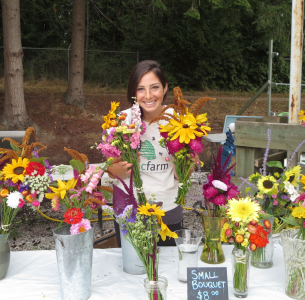
Samantha became a member of the UBC Farm family in the 2013 growing season. She transitioned straight from the UBC Farm Practicum to a Master’s degree program in the Faculty of Land and Food Systems, where she studied agricultural policy and food sovereignty in the BC dairy industry.
Samantha graduated in the Spring of 2016 and by the end of summer, she had secured a job as Community Animator for Farm to School’s Vancouver Area Regional Hub. Farm to School BC (F2S BC) is an umbrella organization that advocates for healthy, local, sustainable school food systems. Her role as Community Animator is literally to “animate” (ie. support/facilitate/coordinate) F2S programs, activities and networks in the Vancouver Area.
“I regularly find myself drawing upon the knowledge and skills I gained from the Practicum, and even more so, upon the incredible network of farmers, activists, experts, and educators — including former Practicum alumni and UBC Farm crew — who have become friends, mentors, and colleagues over the past 4 years,” says Samantha. “It’s been a gift to work alongside this passionate and inspiring community towards the development of sustainable, just and healthy regional food systems!”
Simone McIsaac and Sarah Stewart
By Justin Lee on August 30, 2017
Simone McIsaac and Sarah Stewart
Simone McIsaac and Sarah Stewart (McMillan) – 2008 Graduates of the UBC Farm Practicum
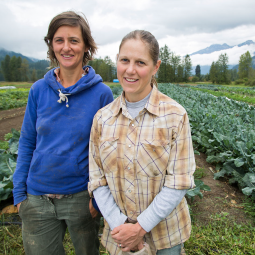
Simone and Sarah met during their practicum at the UBC Farm in 2008, and are now co-owners of Rootdown Organic Farm, a mixed vegetable farm serving restaurants, grocery stores and CSA members in the Pemberton and Whistler area. After completing the practicum at the UBC Farm, Sarah started Rootdown in 2009 and Simone joined the following year, after working at another farm on Vancouver Island. Since 2010, the farm has developed into a multiple-acre project, serving 20 restaurants and grocery stores, and over 70 CSA members, as well as raising Heritage pigs. The practicum program served as a foundational stepping stone for both Sarah and Simone, providing a wide array of organic farming resources on a spectrum of topics that has allowed them to grow into the farm that they are today.